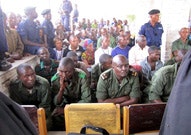Fizi Diary: Finally, Justice For All?
By Kelly Askin
While the last two decades have seen a global paradigm shift toward accountability for the most serious international crimes, there is now broad recognition that the existing system can handle only a small number of the worst civilian and military leaders—the most notorious physical perpetrators. Thousands—perhaps even millions—of others will escape punishment in specialized courts. And the suffering of tens of millions of victims of atrocity crimes committed in war and brutal oppression worldwide often go unaddressed.
Even in the age of the International Criminal Court, enforcing local and international laws remains primarily the responsibility of national jurisdictions. This concept—known by ICC supporters as complementarity, since domestic trials “complement” the efforts of the ICC—is well at work in the Democratic Republic of Congo (DRC). Here, in South Kivu, a mobile gender justice court has already prosecuted over 150 individuals in the past 18 months, and is currently holding a trial in which rape is treated as a crime against humanity. Charged are a lieutenant colonel and ten of his soldiers for the mass rape and other crimes committed in the nearby town of Fizi.
Professional military judges, prosecutors, defense counsel, and civil party lawyers have been studiously adjudicating the case for over a week, and hundreds of locals have turned out daily to observe their first trial ever.
I’ve been observing the mobile court trial for several days and have been impressed with the proceedings, which have been as professional and fair as trials I've observed in such tribunals. It certainly has been far more expedient than any other legitimate atrocity crimes trial, being held some six weeks after the crimes were committed. The local police, the UN, and NGOs participated in the investigation.
Colleagues and I asked some survivors here if they had heard of the ICC, which is deeply involved in DRC cases. The trials of Thomas Lubanga and Germain Katanga and Mathieu Ngudjolo-Chui are underway, and the trial of Calixte Mbarushimana is expected to begin soon. Bosco Ntaganda is still at large and apparently roaming around freely in Goma. Former Congolese vice president Jean-Pierre Bemba is also on trial at the ICC, principally for sex crimes committed in Central African Republic.
In general, unless they listen to the radio regularly, victims and others here in this very remote area of Congo are unaware of the ICC. That may not be too surprising, as the other trials—not including that of Mbarushimana, which hasn't started yet—were committed outside Kivu. But then, as my colleague Louise Olivier reported yesterday, some of the accused, including the leader, apparently are aware of the ICC. Lt. Col. Kibibi reportedly assured his troops before the orchestrated attack in Fizi that they wouldn't go to The Hague for this.
Unquestionably, Kibibi and his soldiers are stunned to find themselves on trial before this groundbreaking domestic mobile court. If word about the court is spread around the country, it could have an enormous impact on deterring future crimes, now that the rule of law is finally being enforced domestically to at least some extent in parts of eastern DRC.
Until July 2015, Kelly Dawn Askin was senior legal officer for international justice with the Open Society Justice Initiative.
